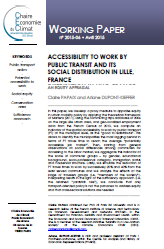
Impacts of decentralised power generation on distribution networks: a statistical typology of European countries
par Darius Corbier, Frédéric Gonand et Marie Bessec
(disponible en anglais uniquement)
The development of decentralised sources of power produced out of renewable energies has been triggering far-reaching consequences for DSOs over the past decade. Our paper benchmarks across more than 20 European countries the impact of the development of renewables on the physical characteristics of power distribution networks and on their investments. It builds quantitative indicators about the dynamics of installed capacity of and generation from renewable sources of electricity, electric independence, quality of electric distribution, the amount of smart grids investments, DSOs capital expenditures, the length of the distribution networks, overall costs of power networks paid by private agents, and electric losses, all in relation with the development of decentralised generation. The heterogeneity of these indicators across Europe appears to be wide notably because of physical constraints, historic legacies or policy and regulatory choices. A cluster analysis allows for deriving 5 groups of countries that display statistically homogenous characteristics. Our results may provide decision makers and regulators with a tool helping them to concentrate on the main issues specific to their countries as compared to the European median, and to look for possible solutions in the experience of other clusters which are shown to perform better for some indicators.
